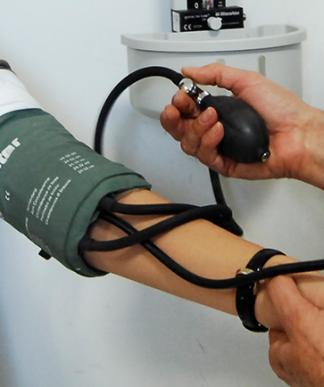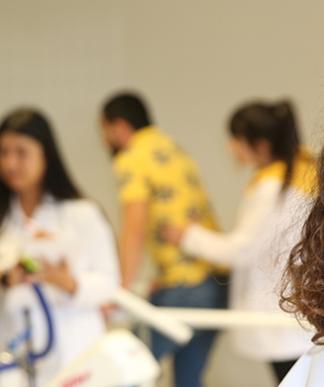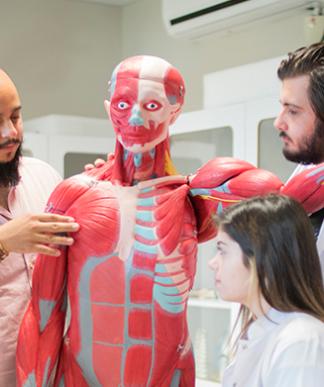


About the Department
The Nursing department curriculum offers graduates essential privileges in relation to the targeted characteristics. This department aims to train nurses who develop nursing practices through critical thinking and research, work as an active member of the healthcare team, provide nursing care services in health, disease prevention, treatment, and supportive qualities through individual, family, and collective "Planned Nursing Care". In addition to the compulsory courses offered to the students according to the program’s learning objectives, elective courses are also offered for the student’s selection so that they are equipped for both professional and personal development in accordance with their interests. Students also have the opportunity to experience many professional skills in a well-equipped laboratory environment. Following the laboratory practices, different hospitals and institutions provide solid knowledge and skills, which acquired during the internship components of the program.
Educational Opportunities
Training is conducted in the form of theoretical, pre-clinical skill and clinical training. There are fully equipped skill laboratories in the department. In the laboratories, there are adult models allowing basic nursing practices, a simulation model for cardiopulmonary massage, pregnancy simulation models for delivery practices, a neonatal care and practice model, incubator, part models, skeleton, anatomy models, sphygmomanometer, aspirator, and chest tube drainage device available. This gives students the opportunity to do small group work and practice all kinds of skills which are necessary for their profession. In addition to this core staff, academic members from other units of the university also offer courses. The department is located on the campus of the university where canteen and cafeteria, sports facility, swimming pool and student dining rooms are available. Our students also benefit from the common library of the campus.

Career Areas
Nurses can work in the governmental and private health sector (hospitals, rehabilitation centers, elderly care homes, nursing homes, family, and community health centers) as nurses or as a chief nurse of units or hospitals. The Nurses' working areas are changing and expanding with the changing health care needs and population structure around the world. In addition to this, shortening of the length of stay in the hospital and the follow-up of the patients and the elderly at home and home care need at home have become important, and nurses can also work in these areas. Graduates can continue their postgraduate education. They can also find employment in nursing schools, vocational health schools after Master and Ph.D. education. This allows graduates to work as individuals who contribute to the development of the profession, both as an instructor and a researcher.
Contact
School of Health Sciences
Çevik Uraz Center, CU206
Tel: +90 392 671 1111 Extension: 2251
Head of Department: Prof. Dr. Fatma EKER
Head of Department E-mail: feker@ciu.edu.tr
Compulsory Courses
First Semester
ANATOMY AND HISTOLOGY
Course code
ANAT103Credit
3Theoretical
3Practical
0Ects
4BASIC COMPUTING
Course code
BILT110Credit
3Theoretical
3Practical
0Ects
4PHYSIOLOGY
Course code
FIZY110Credit
3Theoretical
3Practical
0Ects
4HISTORY OF CIVILIZATION
Course code
HIST100Credit
0Theoretical
2Practical
0Ects
2INTRODUCTION TO NURSING
Course code
HMSR105Credit
2Theoretical
2Practical
0Ects
3DEONTOLOGY AND ETHICS IN NURSING
Course code
HMSR109Credit
2Theoretical
2Practical
0Ects
3ELEMENTARY ENGLISH-I
Course code
INGL123Credit
3Theoretical
3Practical
0Ects
4INTRODUCTION TO PSYCHOLOGY
Course code
PSKO103Credit
3Theoretical
3Practical
0Ects
4MODERN TURKISH HISTORY
Course code
TARH100Credit
0Theoretical
2Practical
0Ects
2TURKISH LANGUAGE
Course code
TREG100Credit
0Theoretical
2Practical
0Ects
2TURKISH
Course code
TURK100Credit
0Theoretical
2Practical
0Ects
2Second Semester
BIOCHEMISTRY
Course code
BKIM120Credit
2Theoretical
2Practical
0Ects
3INTERPERSONAL RELATIONSHIP
Course code
HMSR104Credit
2Theoretical
1Practical
2Ects
3FUNDAMENTALS OF NURSING
Course code
HMSR106Credit
11Theoretical
5Practical
12Ects
11ELEMENTARY ENGLISH-II
Course code
INGL124Credit
3Theoretical
3Practical
0Ects
4MICROBIOLOGY AND PARASITOLOGY
Course code
MIKB104Credit
2Theoretical
2Practical
0Ects
3FREE ELECTIVE
Course code
SSECXX1Credit
3Theoretical
3Practical
0Ects
6Third Semester
SUMMER TRAINING-I: FUNDAMENTALS OF NURSING
Course code
HMSR200Credit
0Theoretical
0Practical
0Ects
5PATHOPHYSIOLOGY
Course code
HMSR205Credit
2Theoretical
2Practical
0Ects
2EVALUATION OF HEALTH
Course code
HMSR207Credit
2Theoretical
2Practical
0Ects
2MEDICAL DISEASES NURSING
Course code
HMSR219Credit
11Theoretical
5Practical
12Ects
11FREE ELECTIVE
Course code
SSECXX2Credit
3Theoretical
3Practical
0Ects
6UNIVERSITY ELECTIVE
Course code
UNISXX1Credit
3Theoretical
3Practical
0Ects
4Fourth Semester
PRINCIPLES OF NUTRITION
Course code
BESD202Credit
2Theoretical
2Practical
0Ects
2GENERAL PHARMACOLOGY
Course code
ECZN210Credit
2Theoretical
2Practical
0Ects
2INFECTIOUS DISEASE NURSING
Course code
HMSR204Credit
2Theoretical
2Practical
0Ects
3SURGICAL DISEASES NURSING
Course code
HMSR218Credit
11Theoretical
5Practical
12Ects
11FIRST AID
Course code
IAYM210Credit
3Theoretical
2Practical
2Ects
4EPIDEMIOLOGY
Course code
SGBL210Credit
2Theoretical
2Practical
0Ects
4UNIVERSITY ELECTIVE
Course code
UNISXX2Credit
3Theoretical
3Practical
0Ects
4Fifth Semester
SUMMER INTERNSHIP-II: MEDICAL NURSING
Course code
HMSR300Credit
0Theoretical
0Practical
0Ects
5TEACHING IN NURSING
Course code
HMSR311Credit
2Theoretical
2Practical
0Ects
3WOMEN'S HEALTH AND DISEASES NURSING
Course code
HMSR315Credit
11Theoretical
5Practical
12Ects
11SUMMER INTERNSHIP-II: SURGICAL NURSING I-II
Course code
HMSR350Credit
0Theoretical
0Practical
0Ects
5BIOSTATISTICS
Course code
ISTA310Credit
2Theoretical
2Practical
0Ects
3UNIVERSITY ELECTIVE
Course code
UNISXX3Credit
3Theoretical
3Practical
0Ects
4Sixth Semester
CHILD HEALTH AND DISEASE NURSING
Course code
HMSR316Credit
11Theoretical
5Practical
12Ects
11AREA ELECTIVE
Course code
HMSRXX1Credit
2Theoretical
2Practical
0Ects
5AREA ELECTIVE
Course code
HMSRXX2Credit
2Theoretical
2Practical
0Ects
5AREA ELECTIVE
Course code
HMSRXX3Credit
2Theoretical
2Practical
0Ects
5RESEARCH METHODS IN HEALTH SCIENCES
Course code
SGBL300Credit
2Theoretical
2Practical
0Ects
3Seventh Semester
SUMMER INTERNSHIP-III: WOMEN HEALTH NURSING
Course code
HMSR400Credit
0Theoretical
0Practical
0Ects
5MENTAL HEALTH AND DISEASES NURSING
Course code
HMSR401Credit
7Theoretical
4Practical
6Ects
7MANAGEMENT IN NURSING& LEADERSHIP
Course code
HMSR403Credit
2Theoretical
2Practical
0Ects
2PUBLIC HEALTH NURSING
Course code
HMSR405Credit
7Theoretical
4Practical
6Ects
7SUMMER INTERNSHIP-III: CHILD HEALTH DISEASES NURSING
Course code
HMSR450Credit
0Theoretical
0Practical
0Ects
5AREA ELECTIVE
Course code
HMSRXX4Credit
2Theoretical
2Practical
0Ects
5Eighth Semester
INTERNSHIP
Course code
HMSR402Credit
10Theoretical
0Practical
20Ects
11GRADUATION PROJECT
Course code
HMSR404Credit
2Theoretical
0Practical
0Ects
2AREA ELECTIVE
Course code
HMSRXX5Credit
2Theoretical
2Practical
0Ects
5AREA ELECTIVE
Course code
HMSRXX6Credit
2Theoretical
2Practical
0Ects
5FREE ELECTIVE
Course code
SSECXX3Credit
3Theoretical
3Practical
0Ects
6Elective Courses
OCCUPATIONAL DISEASES IN HEALTH INSTITUTIONS
Course code
SAGY411Credit
3Theoretical
3Practical
0Ects
0HEALTH SERVICES IN DISASTER
Course code
SGBL322Credit
3Theoretical
3Practical
0Ects
4GERIATRICS
Course code
HMSR213Credit
2Theoretical
2Practical
2Ects
5RATIONAL DRUG USAGE
Course code
HMSR212Credit
2Theoretical
2Practical
0Ects
5TRANSCULTURAL NURSING
Course code
HMSR307Credit
2Theoretical
2Practical
0Ects
5SEXUAL HEALTH
Course code
HMSR309Credit
2Theoretical
2Practical
0Ects
5NURSING INFORMATCS
Course code
HMSR214Credit
2Theoretical
2Practical
0Ects
5DOMESTIC VIOLENCE
Course code
HMSR308Credit
3Theoretical
3Practical
0Ects
6PALLIATIVE CARE
Course code
HMSR215Credit
2Theoretical
2Practical
0Ects
5ONCOLOGY NURSING
Course code
HMSR314Credit
2Theoretical
2Practical
0Ects
5QUALITY OF HEALTH CARE
Course code
HMSR216Credit
2Theoretical
2Practical
0Ects
5HEALTH PROMOTION AND HEALTH EDUCATION
Course code
HMSR217Credit
2Theoretical
2Practical
0Ects
5DIABETES NURSING
Course code
HMSR320Credit
2Theoretical
2Practical
0Ects
5GROWTH AND DEVELOPMENT
Course code
HMSR310Credit
2Theoretical
2Practical
0Ects
5EVIDENCE-BASED PRACTICES AND NURSING
Course code
HMSR410Credit
3Theoretical
3Practical
0Ects
6COMMUNICATION IN HEALTH
Course code
SGBL260Credit
2Theoretical
2Practical
0Ects
2HEALTHCARE MANAGEMENT
Course code
SAGY102Credit
3Theoretical
3Practical
0Ects
8TR Applicants
TR Students who are successful in the exams conducted by the Higher Education Council Student Selection and Placement Center (ÖSYM) and are entitled to enroll in our university in line with their preferences can complete the registration process with the necessary documents for registration from our Registration and Liaison Offices throughout Turkey or from the Marketing Directorate on campus.
Click for detailed admission requirements information.
TRNC Applicants
TRNC citizens and TR citizen candidate students who have completed their entire high school education in TRNC. They are placed in undergraduate programs in line with their success in the CIU Student Placement and Scholarship Ranking Exam and the programs they prefer.
Students who are successful in the exam can register from the TRNC Marketing Office.
Applicants can directly apply online to our undergraduate programs using the application portal. Please fill in your details correctly and upload all the required documents listed on the last page of the application form.
Required documents;
- Completed application form,
- Higher/Secondary Certificate or equivalents (e.g. O/A’Level, WAEC/NECO),
- Evidence of English Language competence: TOEFL (65 IBT) or IELTS (5.5). Students without these documents will take the CIU English proficiency exam on campus following arrival,
- Scanned copy of international passport/birth certificate,
- Fully completed and signed CIU Rules and Regulations document (which can be downloaded during the online application).
Cyprus International University provides academic scholarships for its students as an incentive for success, with most students benefiting from 50%, 75% or 100% scholarships or discounted tuition fees. Click for more information.
Tuition Fees are determined at the beginning of each academic year. Candidate students who are entitled to enroll in CIU can learn their fees in line with the Tuition Fee Calculation system.